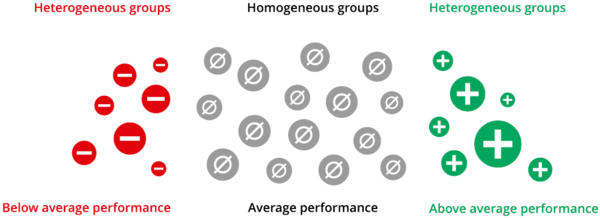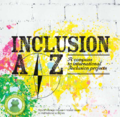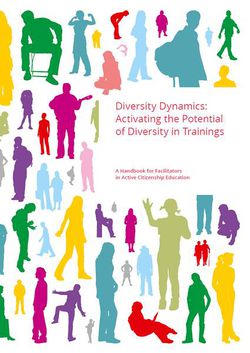We can summarize the results of these studies with the following image: Compared to a team with more homogeneous groups, more diverse heterogeneous groups’ performance in creative tasks will tend to be broader on both ends of the scale; they have the potential to either to perform either above or below average. Heterogeneous groups will often be known for performing much better or much worse than average. Homogeneous groups, in contrast, will basically remain at the same average performance level at all times. [1]
As diversity is not only social diversity but as well the diverse personality styles people have, especially here seems to be a big outcome for diversity management. When teams include members with cognitive diversity, different ways of thinking and perceiving, this seems to have a positive influence on a team's performance. [2]
Contents
Well Managing Diversity
So is diversity a good thing? Who is right? Both sides are: greater diversity leads to greater creativity, but only when it is managed well. It is not enough to collect a diverse group of people, put them onto a team together, close the door, and wait for great results. To adjust for this, quota regulations, codes of conduct, or mentoring programs on diversity are implemented in the working sphere more and more frequently. Implementing a culture of diversity in a working environment can lead to a competitive advantage.
One might be sceptical as to whether this is enough to cause a cultural shift and many people argue against making this line of reasoning normative. But facilitators or activists who incorporate diversity-aware behaviour have an advantage in communication, management, and collaboration. Therefore, we should also implement a culture of diversity within trainings on topics not directly related to diversity, such as project management, leadership skills, or analytical competence. In addition, in our field of work diversity is almost always a relevant issue in our training groups, so we should increase awareness of it in order to benefit from it.
Challenges
Diversity awareness is a key issue, especially for facilitators. There is a Polish saying that goes, “A fish rots from the head down.” When you want to change or improve something, you have to start with the top. Many studies on diversity management show that leaders’ attitudes play a crucial role in the successful implementation of a culture of diversity in their working environment. We assume that facilitators in a seminar can have similar indirect influences on the group. Therefore, we will start with a chapter that focuses on a diversity facilitator’s attitude. The challenges in fulfilling this role responsibly lie on a variety of levels.
The impact of a teaching, learning or facilitating method lies in the facilitator’s attitude, not in the method itself. Therefore we need to understand and question
- our own habits and culture
- our team’s habits and cultures as well as those of our participants
- the societal structures that impede or slow down processes of change towards equality and participation.
Inspiring Handbooks and Sources from the Community
Diversity in Youth Exchange Checklist
from German-Polish Youth Exchange
DownloadMy ID Training Background Reader
Of the project My ID (My Identity, My Idea to be Myself) on sexual orientation and gender identity (in schools)
DownloadDIVE-IN
A guidebook of guidebooks for facilitators in Diversity & Inclusion pedagogies
DownloadStories that move
Free online tool for teaching about diversity and discrimination
WebsiteTrainer Manual: Mainstreaming Gender into Peacebuilding Trainings
Dr. Cordula Reimann, CORE
DownloadResource Mobilization Toolkit
FRIDA's toolkit (not only) for girls, young women and trans youth
DownloadToolkit Social Inclusion
Toolkit 8 of Council of Europe
DownloadIdeas, resources, methods and activities for non-formal intercultural education
DownloadDiversity Dynamics: Activating the Potential of Diversity in Trainings
Heike Fahrun, Eliza Skowron, Nils-Eyk Zimmermann, MitOst
Handbook for Facilitators
DownloadGender Matters
A manual on addressing gender-based violence affecting young people
DownloadBuilding Trust in Diverse Teams
A concise facilitation handbook by OXFAM
DownloadInclusion A-Z
How to manage inclusion in international projects
DownloadUnderstanding You(th)
Exploring Identity and its Role in International Youth Work
DownloadDiversity Style Guide
By R. Kanigel/Journalism Department at San Francisco State University
OnlineInnovation Diversity - New approaches of Cultural Encounter in Europe
Un-Label's handbook on inclusive art practices
DownloadDiversity Toolkit
to University of Southern California's Guide to Discussing Identity, Power and Privilege
Website
References
- ↑ E. Skowron in: H. Fahrun, N. Zimmermann, E. Skowron: Diversity Dynamics: Activating the Potential of Diversity in Trainings; Berlin 2014; MitOst; ISBN 978-3-944012-02-5
- ↑ Alison Reynolds, David Lewis: "Teams Solve Problems Faster When They’re More Cognitively Diverse" in: Harvard Business Review , March 2017




















